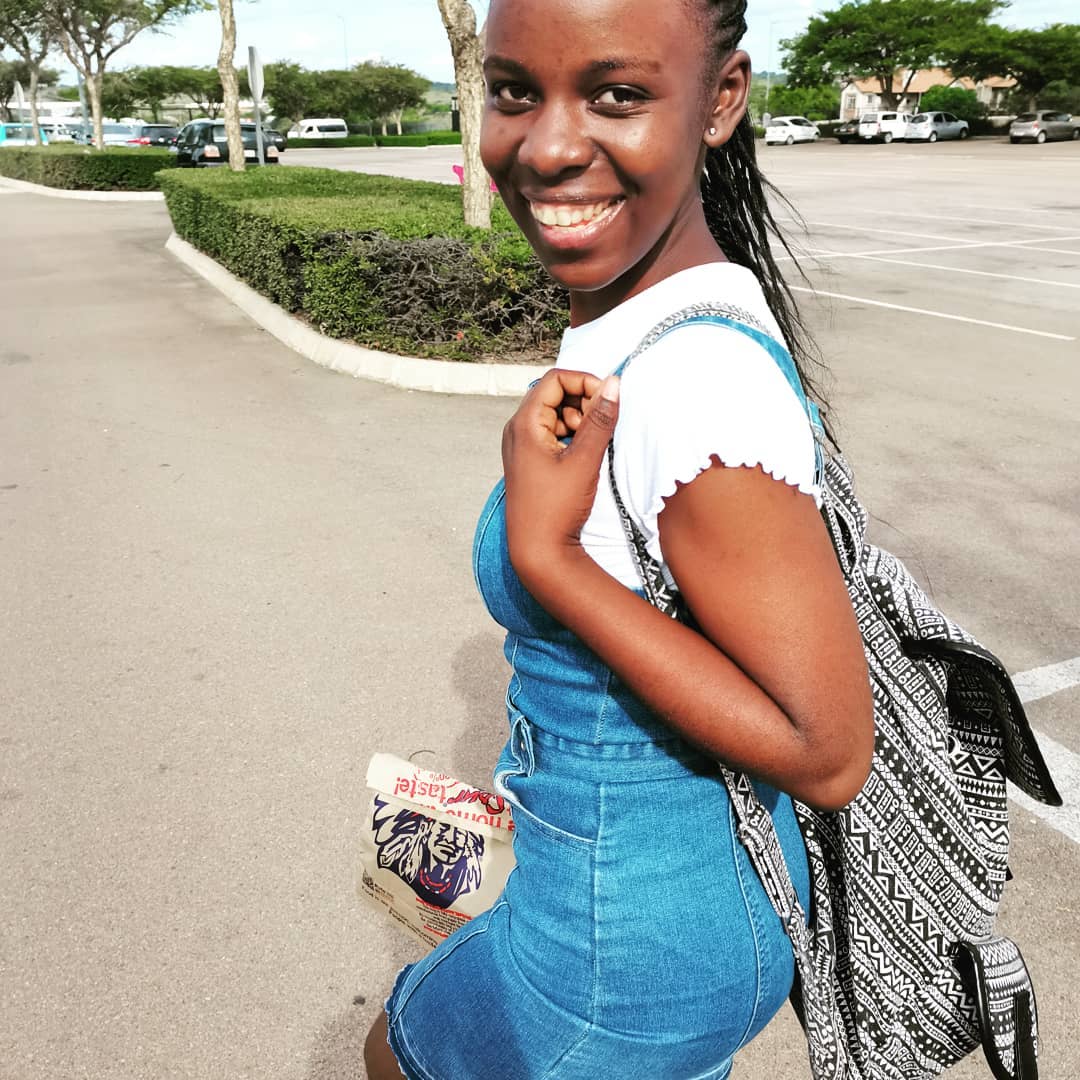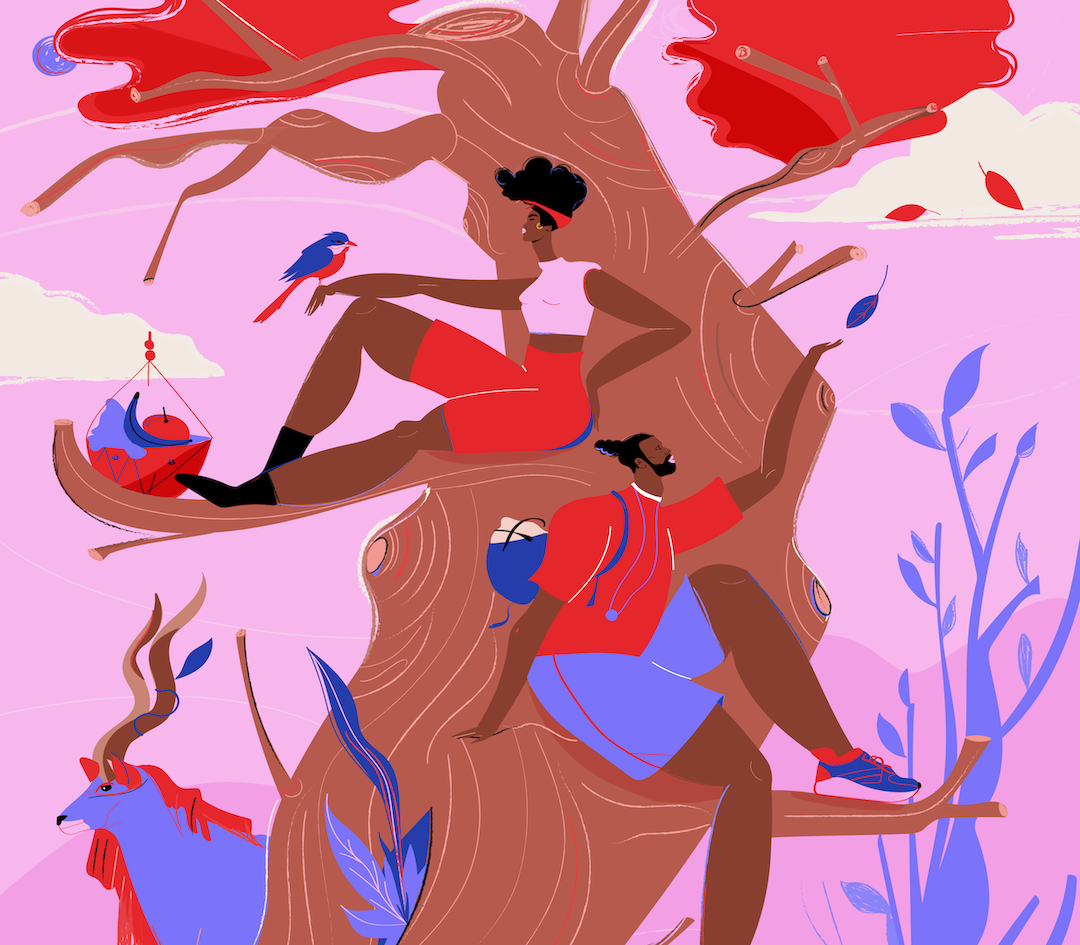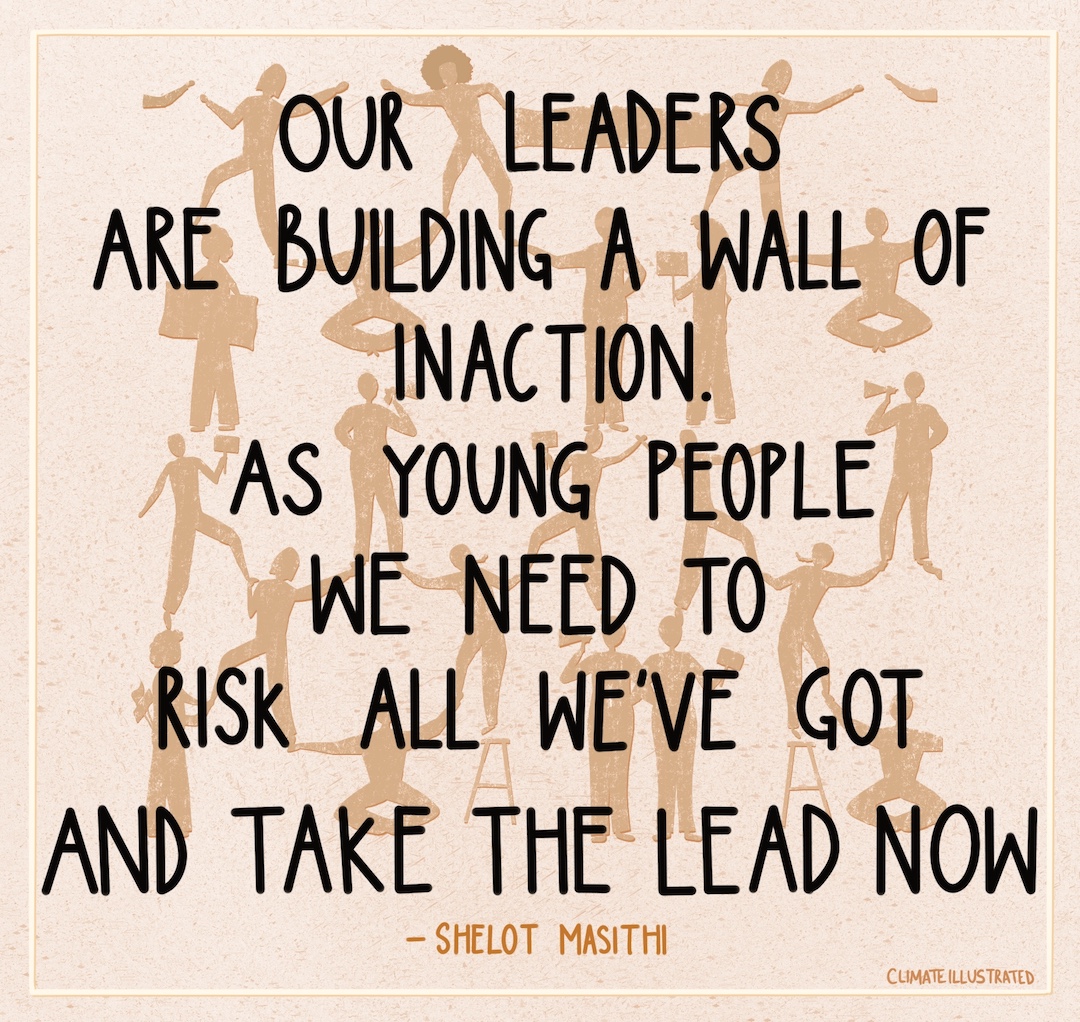– We need each other to solve problems and to survive in this society

Shelot Masithi talks about Ubuntu, eco anxiety, racism, storytelling, and how she thinks young people today need to take the lead.
In this talk, we explore the future we want and the dangers of ignoring the now. Read on to learn about Ubuntu – a South African philosophy – and Shelot’s reflection on how together we can chart a new course that addresses colonialism, racism, and the climate crisis.
Shelot Masithi is an environmentalist from South Africa. She is the founder of She4Earth and works with youth restoring indigenous knowledge through environmental education. Shelot was part of our project The Future We Want: Stories of Recovery.
Marte Skaara (Oslo, Norway) is a co-founder and the Creative Director at Climate Creativity. She is a farmer, journalist, and human geographer who cares deeply about our connection to land, ocean and each other.
The Future is Ubuntu
Marte - You wrote a wonderful story about moving from hopelessness and anxiety, through standing firm in Ubuntu environmentalism, creating a world where the principles of Ubuntu brought the world together to deal with the great challenges we are facing. Would you like to read your story for us?
Shelot – My story is titled The Future is Ubuntu.
Ubuntu is a South African Indigenous philosophy of togetherness, meaning, Umuntu ngumuntu ngabantu (I am human therefore we are). It refers to the interconnectedness of all humans -– the intersectionality of humanity, nature and biodiversity. Ubuntu is unity, love, and kindness, and holds us to a moral obligation that we are in this together and we need each other.
Ubuntu environmentalism created a constellation of a new generation of climate justice leaders. It was Ubuntu that brought nations together to fight Covid-19 and the climate crisis. Ubuntu is what I have learnt and continue to live in this green world today.
It is beautiful and peaceful here, with so much peace and love in our world. Mankind embodies Ubuntu, living it, experiencing it. The beauty that shines through the children’s smiles is unimaginable. No more quarrels and quivers of people fighting each other over resource scarcity. I committed myself to changing the greenwashing spheres that were shaping the world into the wrong direction. I am proud of myself to have won such a difficult war in the history of mankind.
“It is beautiful and peaceful here, with so much peace and love in our world. Mankind embodies Ubuntu, living it, experiencing it.”
Out the windows, the trees are clustered into a beautiful poem, and flowers into a soothing song. The birds are chirping gracefully, and the clouds won’t stop smiling. The Earth is green again. This is the future I have fought for.
Never again shall mankind fight nature to feed its greed.
Marte - In your story, you talk about Ubuntu. Would you like to tell a little bit more about this philosophy?
Shelot - Ubuntu originated here in South Africa in between the Zulu and the Xhosa language. This philosophy embodies the advocacy for human beings and planetary life. It kind of looks into human beings and nature, and also within ourselves as individual human beings.

Illustration by Carolina Altavilla
We often look to the outside world for problems and solutions, and ignore the most important part of problem-solving, which is actually us as individuals. This is because we are not only disconnected with social life, but we are also disintegrated with ourselves as individuals.
Ubuntu invites us to look within ourselves, reconnect with ourselves, then heal ourselves spiritually and find grounding within. Ubuntu enables us to go outside and say, “now, because I have that grounding, because I understand myself better, and because I’m better connected with myself, I can go out and solve this problem or help someone solve this problem.” That’s how Ubuntu should be applied and elevated in society.
We need people to come together and understand that we are all human beings, and we need each other to solve problems and to survive in this society.
Marte – How do you practice Ubuntu in your life? How does this philosophy guide your work with climate change?
Shelot - The climate crisis is a very complex problem. There’s a lot of eco anxiety and eco trauma happening because of issues such as the climate crisis, plastic pollution, soil degradation, and food insecurity – and all these problems are interrelated.
I cannot solve all those problems by myself. I need to listen to others, breathe, take care of myself, and take it one step a day, and one thing at a time. It’s important to listen to your body, understand what your body needs, and be kind to yourself first; then you can also be kind to the next person.
“I cannot solve all those problems by myself. I need to listen to others, breathe, take care of myself, and take it one step a day, and one thing at a time.”
Even if I don’t go outside today to collect plastic trash, I have that grounding that I’m taking care of myself and taking the time to release the tension in my head, because there is a lot going on and these problems are all happening at the same time.
Navigating colonialism, racism, and the climate crisis
Marte - That’s so important. Thank you for bringing that up. I think everyone who works on these issues, we’ve all felt these challenging emotions, such as anxiety, loss, hopelessness, and anger. I think it’s important that we talk about and acknowledge these difficult emotions. How can we dream about a good future and still acknowledge all the difficulties that are here in the present?
Shelot - That’s a tough question. When I was looking at the questions you sent, they are related to all the problems, like the historical problems of colonialism and racism and how we can navigate these problems.
I don’t really have a specific answer, or I cannot say that this is the exact answer, but what I can say is that bringing all the different perspectives to the table and acknowledging that we have different ideas, experiences, and backgrounds is important.
It’s not easy to find spaces where you can tell your stories without other people telling you that, “No, you need to tell your story in this manner”. I think a lot of people hold their stories back because they don’t want to experience judgments or bad comments.
“I think a lot of people hold their stories back because they don’t want to experience judgments or bad comments.”
So, bringing us all to understand and acknowledge that we don’t know everything, and we don’t know what other people are experiencing, and to give people that space to tell their stories the way they want that story to be told without asking them to reframe what they are trying to tell, that is valuable.
It’s problematic when somebody’s trying to tell a story, for example, if someone is talking about environmental racism and how they experience racism in different spaces, and someone else is there speaking from a very privileged position saying, “You cannot say ‘racism’. How about you use this concept or this term in this manner?” It becomes a scary space where people hold back sharing their stories because now they are trying to weed out certain experiences. It becomes exclusionary.
Marte - In your work, you make a lot of effort to highlight African stories, perspectives, and ideas in relation to climate change and the environment. You, participating in The future we want, led us to create a story project together that is called Ubuntu Climate, a project that aims to highlight African stories, and I think it’s great that we can keep working together and keep collaborating.
I think that’s one thing that is lovely about Ubuntu that it gives you values to go from, and I’m wondering what you see as the most important value for you when you think about the here and now, as well as the future?
Shelot - The decision makers talk about the past, the future, but ignore the most important part, which is the present. Climate change, food insecurity, land degradation, soil degradation - these are the things that are happening now.
As young people, we are standing in-between the now and the future, and our leaders are building this wall of inaction. When you listen to the speeches and promises that leaders and stakeholders in business are making, it becomes clear that our leaders are pushing action further into the future.
We have Agenda 2030. We don’t have Agenda 2022. We never have Agenda NOW. It’s always Agenda FUTURE, and that’s the problem because it takes us away from demanding action now.
“We have Agenda 2030. We don’t have Agenda 2022. We never have Agenda NOW.”
I think there’s a lot of disintegration in the south, and there’s a lot of disintegration in society, so I think my most important value will be collaboration. As an individual, I can only do so much, but together, as a team, a collaborative community, we can get a lot more things done.
I wouldn’t even put this value in the future, only in the present, because if we are to solve the problems, we need to look at what is happening now, and what is needed now, because in the future we may not be able to be there. This may be the end.
Young people taking the lead
Marte - Yeah, collaboration and connection are so important, as well as what you say about being and acting in the present. I love the saying that ‘the future is now’. The future is the next second, the next hour.
You talk about nations who are just pushing climate action forward all the time and I see that happening in Norway. In my country, we just keep producing oil, and we experience very mild impacts of climate change compared to the most impacted countries. Politicians commit to reducing emissions but, when the deadlines approach, they just push them forward into the future, and that is just not useful.
I wish the politicians would read The future we want stories to see what the youth wants and then to act now to make sure that there actually is a future.
I’ve been holding workshops in Norwegian schools. I asked a high school class what they hope for, and there was this one girl who said, “I hope we’re not the last generation”. For youth to go around worrying about being the last generation, that’s just not how it should be.
Is there something you want to say that you don’t feel we have had the chance to speak about? Is there anything on your mind that you want to share?

Illustration by Manini Kumar
Shelot – We need each other to solve all the problems and the climate crisis. You may be working in the education sector or the health sector but know that you’re also playing your part in solving the other problems because they are all interrelated.
We need to learn to collaborate, especially as young people. Instead of listening to the philosophy that young people are the future leaders, we need to take our stand and risk all that we’ve got to take the lead now, because really there’s nothing that’s getting done in a room full of old people.
Marte - I think those are wonderful words to end with. I want to thank you for taking part, and for sharing your reflections, ideas, and your story in this conversation. I really appreciate it.